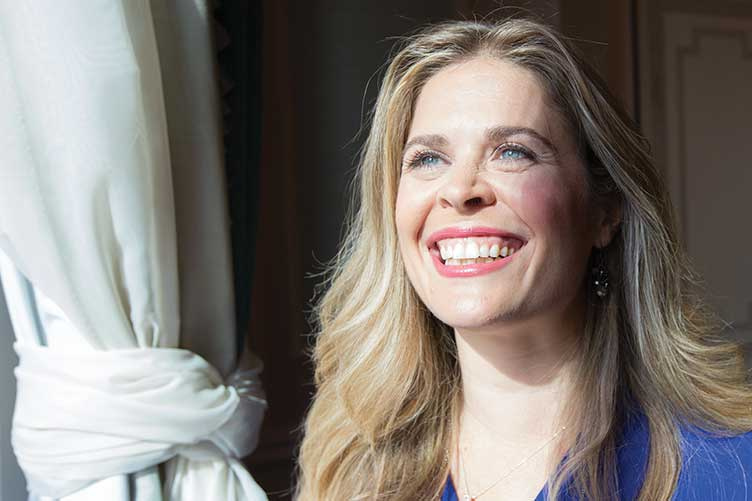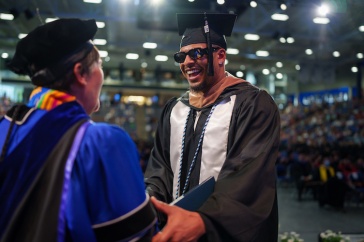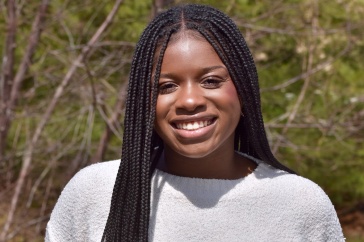
Screenwriter and director Jennifer (Rebecchi) Lee ’92 is living like a princess—the kind of hard-working, modern Disney princess she writes about. In the fall, Lee became the first woman ever to direct a Disney animated feature: “Frozen,” one of the biggest box office hits of 2013. With the movie’s success, she suddenly became the face of a worldwide Disney publicity blitz, jetting off to the Dubai Film Festival, Mexico City, and Japan, among other places, with co-director Chris Buck. So far, “Frozen” has collected Golden Globe and Critic’s Choice awards for best animated feature, five Annie Awards—including best director and best feature—and a nomination for that holiest of all Hollywood grails, an Academy Award. All the hoopla has left Lee exhausted, but giddy. “I don’t know what to make of it,” she says, “except to have moments of ‘Wow—is this really happening?’”
Lee is just the latest UNH grad to make a splash in Hollywood, joining Emmy nominees Mike O’Malley ’88 and Channing Chase ’61; hockey-player heartthrob Michael Ontkean ’70, best known as a TV cop on “Rookie” and “Twin Peaks” and for his movie debut opposite Paul Newman in the hockey sendup “Slap Shot”; and hit producer Marcy Peterson Carsey ’66. Other UNH alums are working behind the scenes to make Hollywood magic as directors, screenwriters, producers, music producers, and special effects artists.
O’Malley and Ontkean both majored in theater, while a number of the others featured here were English majors. A few majored in disciplines that had nothing to do with movie-making, but turned out to be useful, including nursing, business, math, and computer science. What all these alums have in common is persistence, the ability to withstand repeated rejection, and excellent networking skills. That’s what it takes to make a career in Hollywood, where 100 projects flop for every one that succeeds, last year’s celebrity is this year’s has-been, and everyone is trying to figure out the next big thing.
A Cinderella Story
Jennifer (Rebecchi) Lee ’92 has enjoyed a rise in the Magic Kingdom as rapid as that of a commoner who marries a prince, thanks in part to a series of opportunities that she was smart enough to jump on—and talented enough to deliver on. The first was a collaboration with screenwriter Phil Johnston, whom she met on her first day at Columbia’s Master of Fine Arts in film program in 2002 and with whom she had remained close friends. In 2011, he tapped Lee to handle the ongoing revisions on his screenplay for Disney’s “Wreck-It Ralph.” She moved from New York to Los Angeles in a week, and ultimately earned a co-screenwriting credit, an Oscar nomination, and an offer to adapt the Hans Christian Andersen fairytale “The Snow Queen.”

Disney had been trying to adapt the story for decades, but it was too abstract and ethereal a tale—until someone suggested that the Snow Queen and the girl who breaks her spell should be sisters. Lee instantly knew that was the right approach and set to work with Buck to hammer out a basic story line. It wasn’t long before John Lasseter, Disney’s chief creative officer of animation, gave them the green light.
Lee’s next big break came when Disney decided to cut the production timetable for “Frozen” from the standard four years to three. She got bumped up from screenwriter to co-director so she could sign off on script changes, while Buck, a former animator and story artist, worked on the visual environment.
In a twist on the classic formula of a princess saved by a chivalrous prince, “Frozen” features a young princess, Anna, whose love for her queenly sister, Elsa, thaws two frozen hearts. Lee, who followed her own older sister, Amy Rebecchi Kaier ’90, from Rhode Island to UNH, says she identifies most closely with Anna. “Elsa is larger than life, like my big sister,” Lee says. Anna “makes a lot of mistakes, puts her foot in her mouth, she’s not the most polished girl, she’s average in every way, and yet I like that she does something extraordinary.”
“Extraordinary” is a pretty good description of Lee’s career so far. Fans have made “Frozen” a box office hit, and critics give it a strong chance to win the Academy Award for best animated feature. As for Lee herself, Variety recently named the former English major one of its Top 10 screenwriters to watch.
Midlife Entertainment

Screenwriter Court Crandall ’87 just wants to have fun—and he wants his characters to have fun, too. Crandall drew on his Phi Kappa Theta memories for the first script he sold: “Old School,” a raunchy 2003 comedy starring Will Ferrell, Vince Vaughn, and Luke Wilson as three men in midlife crisis who decide to start a fraternity near their alma mater. “‘Old School’ is about getting to a point in life where you say, ‘Huh? Where’d the fun go?’” Crandall says.
Unlike his characters, Crandall seems to have had fun at every stage of his life. He came to UNH because, when he visited on a warm April day, he saw lots of students outside throwing Frisbees and thought, “these people know how to have fun!” As an English major, he toyed with sports writing and broadcasting, journalism, and fiction. But when he needed a job after graduation, he opted to follow his dad into advertising. “I thought, ‘You get paid money just to make up funny stuff?’ So I put together a portfolio and was lucky enough to get a job,” he says.
After a successful advertising career in Boston and New York, he got an offer from an LA ad firm, moved his family to Manhattan Beach, and began writing screenplays for comedies. And while he made his name by focusing on fun, Crandall’s most recent work shows off a more serious side. He wrote, directed, and shot the 2013 film “Free Throw”—a documentary about basketball-playing students at Compton (Calif.) High School— in the space of two weeks.
Crandall’s oldest son had played basketball for years with kids from Compton, a city known for gang violence and gangsta rap. “I just thought what sweet young kids they were, and they defied any notions you might have of what kids from Compton might be like,” he says. The film—framed by a free throw contest Crandall created in which one of eight seniors wins a $40,000 college scholarship—shows the difficulties facing these students, from poverty to violence to pregnancy, and how hard they have worked to qualify for a college education.
Next up for Crandall are a documentary about a man wrongfully imprisoned for 19 years, a comedy set in Maine, and a pilot for a Fox sitcom—supervised by Mike O’Malley ’88. “I’m going to keep writing,” he says. “I don’t know how to do anything else.”
More Than a Funny Face
Mike O’Malley ’88 and Court Crandall ’87 first met in Hunter Hall, where they bonded over their mutual hatred of Sammy Hagar’s song, “I Can’t Drive 55”—which O’Malley’s roommated liked to play at top volume. O’Malley started spending time in Crandall’s room, and the upperclassman quickly came to appreciate the freshman’s wit. “Mike always had something to say,” Crandall recalls. “It didn’t matter the subject—he always got me laughing so hard that whatever I was drinking would come out my nose.”
The pair became good friends and after graduation followed each other’s rising careers. They reconnected when Crandall was working on a big ad campaign for ESPN and persuaded the director to audition O’Malley for the role of “The Rick,” a rabid Boston sports fan who lives over his parents’ garage. “Mike came in and just crushed it,” Crandall says.

Best known for his portrayal of comic characters, O’Malley starred in “Yes, Dear” for six seasons and got a 2010 Emmy nomination for his portrayal of Burt Hummel, the father of a gay student on the popular Fox musical comedy “Glee.” But O’Malley is more than just a funny face. He has authored three stage plays, a screenplay, and several episodes of the Showtime series “Shameless.” A diehard Boston sports fan, he’s now working with Red Sox chairman Tom Werner and LeBron James on a TV movie about two NBA players from a tough neighborhood.
Typically confined to roles as “a middle-aged dad somewhere in America” when he acts, O’Malley loves writing because he can’t be typecast. “I get a lot of my creative satisfaction by stretching and doing things that are different,” he says. “You’re able to have more flexibility when you’re a writer.”
O’Malley recently starred in another NBC comedy, “Welcome to the Family,” where the professional “family” included producer Barbara Stoll ’74 and first assistant director Xochi Blymyer ’84. The show premiered last fall in the Thursday-night lineup, but NBC cancelled it after only three episodes when it failed to garner good ratings or kudos from critics. O’Malley is philosophical about the cancellation, but it was still hard to say good-bye to the cast and crew. “After the show is over, you’ll mostly likely never see them again,” he says. “It’s like the collegiate experience over and over again: short bursts of intensity, and then it’s over.”
Moxie and Connections

Barbara Stoll ’74 didn’t wait to be discovered. She was majoring in child development at UNH with a minor in communications when she had a brainstorm about how to combine her two passions. On impulse, she called Children’s Television Workshop, the producers of “Sesame Street,” to see if they had summer jobs. To her astonishment, they offered her an internship, and she spent a summer in New York showing newly developed segments of the show to children in Head Start programs in Harlem. The experience cemented her ambition to go into television. “I think all of us out here [in Hollywood] are driven,” she says. “We decide what we want and then we go for it.”
In Stoll’s case, “going for it” included moving to Los Angeles and enrolling in the Master of Fine Arts in film program at UCLA, where her moxie once again landed her a job. “The night before my graduation, I met a woman at a party who said, ‘What are you doing?’ I told her, and she said, ‘I have an opening for a unit manager position—are you interested?’”
Stoll jumped at the chance to work at MetroMedia’s television production studios. But if moxie opened the first few doors, relationships opened many more. A producer she met at MetroMedia offered her a job on the ABC show “Amanda’s by the Sea.” Later, she met “Roseanne” producer Al Lowenstein, under whose mentorship she rose from associate producer to co-producer to line producer over eight seasons. Most recently, she was thrilled to be part of Mike O’Malley’s latest sitcom, “Welcome to the Family,” and calls the show’s cancellation tough. “It was a really terrific working situation,” she says.
She’s already moved on, though. In January, she produced a pilot for CBS called “The McCarthys,” and she’s working on another, “Fifth Wheel,” for NBC.
A Family Affair
Xochi Blymyer ’84 never thought her college math major would help her land a Hollywood job, but when the assistant director on the Arnold Schwarzenegger film Red Heat needed someone who could figure out the first generation of computerized scheduling software, Blymyer—and her computer skills—were just what he was after.

Now a first assistant director herself, Blymyer says her math background is still a central part of her work. Her role is essentially that of a general contractor, figuring out each day’s shooting schedule based on actor availability, crew overtime, location availability, equipment, weather, and a million other details. On the set, she translates the director’s instructions into tasks for the actors and crew. “Math helps when you’re trying to solve problems or put pieces together,” she says. “It’s a good background for what I have to do.”
Blymyer grew up in the movie industry, skipping from one school on an Indian reservation to another in the Bahamas because her parents—her dad was a gaffer and her mother was a hairdresser to the stars—were on location. When they bought an inn in the White Mountains, she decided to go to UNH and major in math, “simply because I was good at it.” The math didn’t work out for her parents, however, who discovered that running a an inn was not a money-making proposition and soon returned to show biz.
After “Welcome to the Family” ended, Blymyer was welcomed back at “The Fosters,” where she had worked previously. She loves her job, but, like her parents, she isn’t crazy about having to go out and hustle the next gig, over and over again. “You never get used to a job ending and not knowing where your next one is coming from,” she says. “I don’t think my parents ever got used to it. My dad always swore that each job was his last and no one was ever going to call him again—and he’s worked for 45 years.”
A Different Drummer
In “Take Me to the River,” a feature-length documentary directed by Martin Shore ’82, legendary Memphis musicians team up with younger rap artists to create original music. There’s William Bell and Snoop Dogg. There’s Otis Clay and L’il P-Nut, a rap prodigy who’s in middle school. Historic clips of Martin Luther King and Otis Redding stand alongside shots of present day Memphis and live-recorded studio sessions. Narrated by actor-musician Terrence Howard, the scenes—a passing of the torch from one musical generation to the next—crackle with creative spirit, funky energy, and genuine love.

“What America gave the world is popular music. We built that foundation,” Shore says. “I wanted the international spotlight to shine back on the place of origin, and what better way to do that than to pair legacy musicians with stars of today?”
A professional drummer, Shore segued into directing by producing albums, making music videos, and producing films. But he first got bitten by the movie bug as a teenager back in 1977, when he helped his older brother, a film major at New York University, make “Punking Out.” They filmed the Ramones, the Dead Boys, and Richard Hell live at famed New York club CBGB, and Shore got to hang out with the musicians during breaks. “It put the fire in me,” he says. “I always felt movies were the ultimate art that was inclusive of everything, from music to art to photography.”
When he got to UNH, Shore majored in business, figuring it would help his career. After graduation, he toured for 10 years as a drummer for Bo Diddley, Bluesman Willie, and Albert Collins, among others. He sees his evolution from musician to music producer to director as a natural progression: One requires a discerning ear, the other a critical eye, and both depend on an unerring sense of rhythm. “A producer for a record is really like a director for a film,” he says.

In 1985, Shore began a brief but lucrative detour into real estate, buying a four-unit apartment building with his former exchange-program roommate at San Diego State. The company grew to include some 35,000 rental units before he left. In 2002, he started Social Capital Entertainment, which produces films, music, and interactive entertainment technology. He now divides his time between Hollywood and the San Francisco Bay Area, where he lives. “Hollywood has its own heartbeat,” he says. “I love LA and southern California, but I think it’s refreshing not to have to be there every day. It would drive me nuts to be in the heart of it all the time.”
Shore may soon be spending more time in Hollywood, though. Early screenings of “Take Me to the River” have earned rave reviews, and the movie will have its U.S. debut at the South by Southwest Festival (SXSW 2014) in early March.
Nurse!
Karen Lagasse Struck ’81 writes about two kinds of hearts: the kind that feels love and the kind that needs bypass surgery.
Struck’s love of writing began in high school, but she chose a more practical career path, earning her degree in nursing at UNH while working in the Lawrence General Hospital ICU. Marriage took her to the Los Angeles area, where she transitioned into medical risk management, but when her company began sending her to San Diego to meet with clients, she decided to use her train commute to start writing again. She bought a bunch of how-to books on different genres, and when she read one on screenwriting, thought, “That’s me!”

Struck wrote her first screenplay, “Charlie & Me,” on the train. The story involves a 12-year-old girl whose grandfather has a heart attack and eventually dies. Two key scenes take place on a train, and all the medical details are precise. It took Struck two years, 25 revisions, and a white knight—long-time television executive Tom Wertheimer—before she finally sold the script to the Hallmark Channel. Ironically, just before the cast and crew flew to Toronto to film, Wertheimer had emergency bypass surgery. Recovering at home, he invited Struck to visit him and watch the daily “rushes,” or raw footage.
“A lot of writers say they’re not included, and this was the opposite of that,” she says. “It was an ideal experience. They knew it was my first film and a new second career, and they never forgot how amazing that was.”
“Charlie & Me” aired in 2008 and was nominated for a Humanitas Award. Struck sold two other projects to Hallmark, and then Wertheimer helped her take the next big step—into television— by passing along her “spec script” for a TV medical drama to Emmy Award-winning writer-producer David E. Kelley. Kelley offered her a staff writing job on “Monday Mornings,” a 2013 TNT series based on Dr. Sanjay Gupta’s novel about the peer review meetings among surgeons at a major hospital.
Drawing on her years of medical experience, Struck crafted scenarios that would trigger legal dilemmas, conflicts, and ethical choices for the characters—including an episode in which a pair of surgeons question whether a man believed to have attempted suicide deserves an organ transplant. That episode netted Struck and Kelley another Humanitas nomination, but the series was not renewed. Still, she calls the show “the experience of a lifetime.”
Struck has several pilots and new scripts in the pipeline, including a movie about a 10-year-old girl, a K-9 officer, and his bloodhound that UP TV will film this year, and a TV series that has nothing to do with medicine. She says the key to a successful career is unwavering commitment, not only to improving your writing, but to promoting your work to agents, producers, and studio executives.
“You have to love it that much, because there’s somebody else who will do all those things. And you get punched down a lot.”
The Brahmin

It’s easy to see why Channing Chase ’61 gets typecast as a blueblood: the sleek blonde bob, the high cheekbones, and the air of cool elegance she radiates. But Chase is hardly a Boston Brahmin. Raised by Polish-American parents in Nashua, N.H., she was Valerie Waraska until early in her stage career, when she took to heart film critic Pauline Kael’s opinion that an actor’s name is his or her trademark and found her new moniker in a friend’s Bennett College yearbook.
“Everybody falls into a type,” she explains, “and it’s very wise to find your type when you first come to LA, because people just don’t know what you’re about, so you have to tell them.”
Since 2007, Chase has parlayed her “type” into a recurring role as Dorothy “Dot” Dykeman Campbell, the high-society mother of Pete Campbell, on the award-winning AMC series “Mad Men.” In the 2013 season, Dorothy went missing at sea, possibly pushed overboard by her caretaker. Chase has no idea whether Dorothy has drowned or will reappear in the final season, which is being filmed now.
“My pet theory is that Don Draper takes up sailing to combat his alcoholism, and he just happens to be sailing by when I fall off the cruise ship, and we sail off into the sunset,” Chase says with a laugh.
Planning to become a teacher, Chase majored in English at UNH—there was no acting major at the time—but joined Mask & Dagger and acted every chance she got. Two UNH grads who hired her for the Keene (N.H.) Summer Theater told her she couldn’t become a teacher; she was too good an actress. After the summer was over, she enrolled in acting workshops—and landed roles—in Boston and New York.

A theater tour took her to Los Angeles, and she decided to
relocate to pursue television roles. She got her first bit part on “The Bob Newhart Show” and went on to play numerous character parts in movies and on TV, including “ER,” “Home Improvement,” “Family Matters,” and “Cold Case.” She also continued acting in a wide variety of roles onstage in California and New York, co-founding the Pacific Resident Theater. “Give me any role on stage,” she says, “because no one can interrupt you and say, ‘Cut!’”
Chase was nominated for a 2013 Emmy for her work on “Mad Men.” Still, if the script calls for her to come back on set, she’ll be lucky to get more than a week’s notice. In the meantime, she’s left guessing—like everyone else—about Dorothy’s fate.
Hit Producer
She’s known as one of the university’s most successful entrepreneurs and leading philanthropists. But Marcy Peterson Carsey ’66 credits her working-class background—her father was a Massachusetts shipyard worker and her mother a bank secretary who left to start a family—for much of her success. As co-founder of the production company behind hit sitcoms like “The Cosby Show” and “Roseanne,” Carsey wanted to create TV shows that reflected the concerns of real-life families—families that looked a good deal like her own.

“A lot of what we did was about couples, relationships, parenting, kids, how life is lived day to day,” Carsey says of her partnership with Tom Werner, with whom she co-founded Carsey-Werner Productions. “You want to get into family dynamics in as realistic a way as possible.”
Family has always been at the center of Carsey’s work. Her career took off in 1974, when Michael Eisner hired her at ABC. She warned him she was pregnant with her first child, but all he wanted to know was whether she planned to come back. “It was a very welcoming period for women,” she says. “ABC was realizing that more women than men watch television and sitcoms, so they’d better damn well have some women making those programming decisions.”
Carsey rose to senior vice president of prime-time programming before leaving ABC in 1980. She lured Werner away from the company two years later, and the duo went on to rack up a slew of hits, from “Roseanne” and “The Cosby Show” to “That ’70s Show,” “Cybill,” and “3rd Rock from the Sun.”
Widely regarded as one of the most powerful women in show business, Carsey, who majored in English at UNH, has used her success to help others—in large part through gifts to her alma mater. In 2002, she gave the university $7.5 million to establish the Carsey Institute, which conducts research on vulnerable children and families. Last year, she pledged an additional $20 million to support the foundation of the Carsey School of Public Policy at the university. For Carsey, it all comes back to her roots: “Being raised in a blue-collar situation makes you not afraid of getting money or losing money,” she says, “because money is just for a roof over your head and food on the table—and for giving to others who need help.”
By Katharine Webster
Photos by David Zaitz unless otherwise noted.
Originally published in UNH Magazine—Winter 2014 Issue

















































